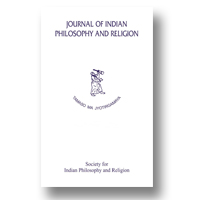|
|
|
1.
|
Journal of Indian Philosophy and Religion:
Volume >
6
Ellen Goldberg
The Haṭhayogapradīpikā of Svātmārāma and the Rahasyabodhinī of Kṛpalvānanda
view |
rights & permissions
| cited by
|
|
|
|
|
|
|
2.
|
Journal of Indian Philosophy and Religion:
Volume >
6
Kenneth Holmqvist, Jaroslaw Pluciennik
The Hebraic and the Indian Sublime from the Rhetoric Point of View
abstract |
view |
rights & permissions
| cited by
In Hegel's 'Aesthetics', one can find a strong distinction between the Hebraic, true sublimity and the Indian, positive sublime. The main thesis of our article is that, from the rhetorical and cognitive point of view, the two sublimities do not form an opposition, although from the theological point of view they do. In order to affirm the thesis, we briefly analyze the main figures of the sublime as presented in Pseudo-Longinos' 'On the Sublime' and the concept of the sublime in Kant. According to our theory of the sublime, the Lyotardian formula of the sublime as 'presenting the unpresentable' should be expressed as 'representing the unimaginable'. When we examine the main examples of the Hebraic and the Indian sublime, we can easily see that in both literary cultures we can find a strong mimetic element as well as antimimetic evocation of the unimaginable. We identify the mimetic element in the sublime texts not only with space seen in accord with Kant but also with 'mimesis of emotion' which is regarded as the main form of mimesis in the ancient Greek tradition, for instance in Plato.
|
|
|
|
|
|
|
3.
|
Journal of Indian Philosophy and Religion:
Volume >
6
Maria Marczewska-Rytko
Science and Religion at the Threshold of a New Millennium
view |
rights & permissions
| cited by
|
|
|
|
|
|
|
4.
|
Journal of Indian Philosophy and Religion:
Volume >
6
Majid Amini
Religious Discourse and Identity
abstract |
view |
rights & permissions
| cited by
There is a widespread assumption that ethnic origins substantially contribute, if not constitute, the identity of individuals. In particular, among the ethnic elements, il is claimed that religion takes precedence and people could be individuated in terms of their religious affiliations. The purpose of this paper, however, is to show that strictly speaking identity cannot be constituted by religion. More precisely, it is argued that a phenomenological characterisation of individual identity fails to do justice to the philosophical requirements of identity. The argument is obviously philosophical by nature and is developed through an analysis of the concept of revelation. The phenomenon of revelation plays a pivotal role in the Judaic-Christian-Islamic tradition, yet by its very nature owes its authenticity to something prior to itself, namely, reason. This entails the priority of reason over revelation and as such undermines claims that purport to define identity in terms of revelation/religion. This detachment of identity from religion would clearly have far-reaching socio-political imphcations for issues such as diversity, pluralism and globahsation.
|
|
|
|
|
|
|
5.
|
Journal of Indian Philosophy and Religion:
Volume >
6
Klaus G. Witz
Toward a Subjective Psychology Inspired by the Upanishadic Notion of Atman
view |
rights & permissions
| cited by
|
|
|
|
|
|
|
6.
|
Journal of Indian Philosophy and Religion:
Volume >
6
Jonathan C. Kramer
The Subjective Experience of Time in Dhrupad, a Genre of North Indian Classical Music
view |
rights & permissions
| cited by
|
|
|
|
|
|
|
7.
|
Journal of Indian Philosophy and Religion:
Volume >
6
Kisor K. Chakrabarti
AAtmatattvaviveka (Analysis of the Nature of the Self) An Annotated Translation:
Reductio Arguments
view |
rights & permissions
| cited by
|
|
|
|





